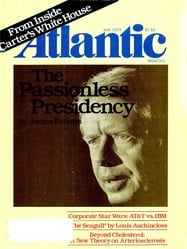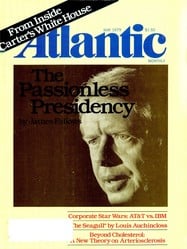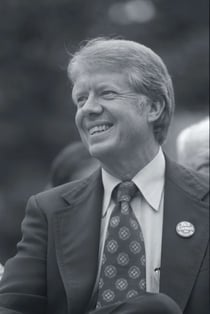Two Jim Fallows on Jimmy Carter - Issue #325

History may not repeat, but it rhymes. It's not hard to see the echoes of the 1970s today: inflation, foreign wars, recalibrating political coalitions, one-term GOP presidents... there may be lessons to learn from what happened then to what might happen now.
Some of this went through my mind when I saw Jimmy Carter announce his hospice care. As a man, his stature has grown in the years since his presidency; as we've gotten more perspective about his presidency, it seems like he was not only emblematic of the 1970s, he may have been the president we needed then. On the other hand, when current events fade into recent history, we tend to grow more accepting of them. Take, for examples, George W. Bush's approval since 2009 or Mitt Romney's reputation since 2012. Nothing has actually changed, but we perceive what happened as more ok than when it was happening.
The difference between active criticism of current events and wise acceptance of the past is really nicely evidenced by one guy: Jim Fallows, who wrote a tell-all about the Carter presidency in 1979, and who wrote a retrospective a few weeks ago. Young Fallows levels criticism after criticism at Carter and his White House; today, Fallows find those criticisms meretricious. What has changed? Nothing about the history itself: Carter's presidency still was what it was. But no, we see it in light of everything else that was happening and everything that happened since.
If we can learn anything from this, then it should be try and see around the things we're arguing about today. Probably in 40 years we'll be less certain than we are today. About a range of things, not the least of which political opinions, we would doubtless behave differently today if we held open the thought that we could be wrong and will probably change our minds. Twenty-five year old me knew a lot of things with certainty that turned out to be wrong, or at least less concrete than I thought.
I would have been wise to put a few more thoughts in italics. Back to Jimmy Carter: in his post-presidential life, he left a fair number of political and policy fights behind. He never helmed anything as large as the federal government. In a sense, he put a fair amount in a category of uncertainty. He kept a few things in bold: he acted on what matters most. He found a greatness mostly beyond politics. He taught a Sunday school class. That's what we should do.
Reading
The Passionless PresidencyThe trouble with Jimmy Carter's Administration by James Fallows in May, 1979. |
|
Jimmy Carter: Unlucky President, Lucky ManNinety-eight years of an exceptional life. What I learned by working for him long ago, and by studying his example since then. |
|

